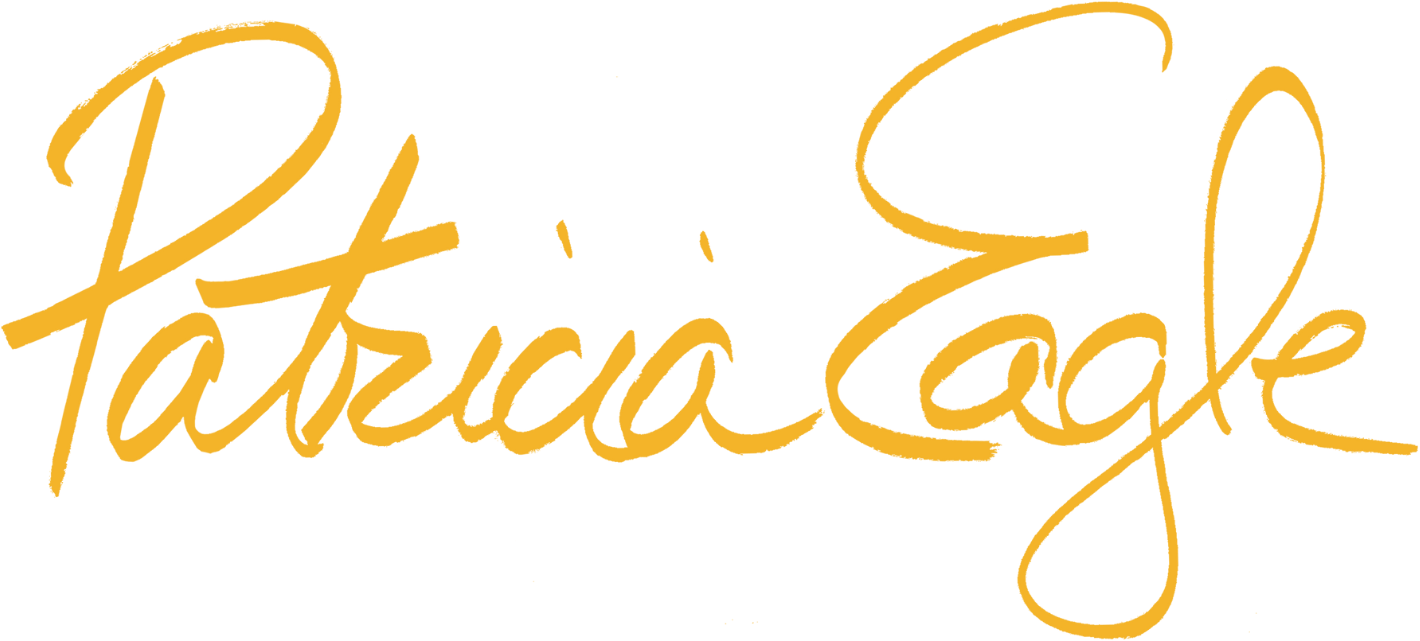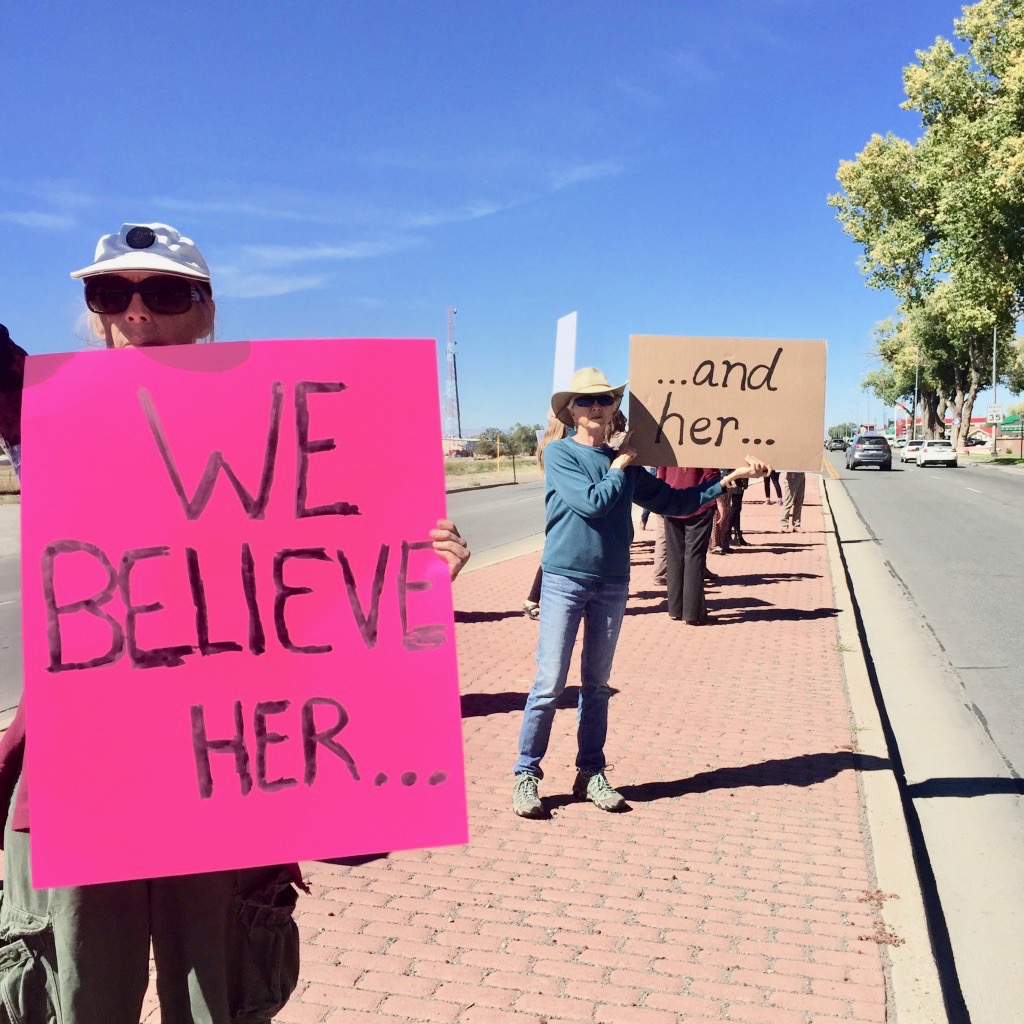
What have you done and do you still do to help cope with what has been challenging in your life?
This question has surfaced in more than one interview that I’ve done since releasing my book, Being Mean: A Memoir of Sexual Abuse and Survival, in June of 2019.
Certainly a relevant query. The 67 stories in my book reveal multiple choices I’ve made to navigate struggles and recover from abuse and heartache. Granted, some of my choices weren’t the best, but I never gave up trying something else in my quest toward stronger mental health.
Quiet Time in Nature, Singing and Walking Prayers, Meditation
Early on I learned to roam and wander in nature. Riding my bike on long country roads or hiking for hours beside the creek behind our house allowed me to calm down while stepping back from the confusion and anger of my home environment.
Arranging for times of silence, usually in nature, remains a priority for me, especially when life rattles my foundation. Many years ago I bought six acres on a remote mountainside here in southern Colorado and moved an old trailer there. I call the spot Graceland, and grace is indeed what this land offers during times when I crave quiet beauty. The natural world is my primary source of spiritual life. Sometimes I retreat to northern New Mexico’s out-of-the-way Christ in the Desert Monastery and put on the medallion that informs others I’m spending time in silence. When all is quiet around me, it becomes easier to sense guidance from a divine Spirit.
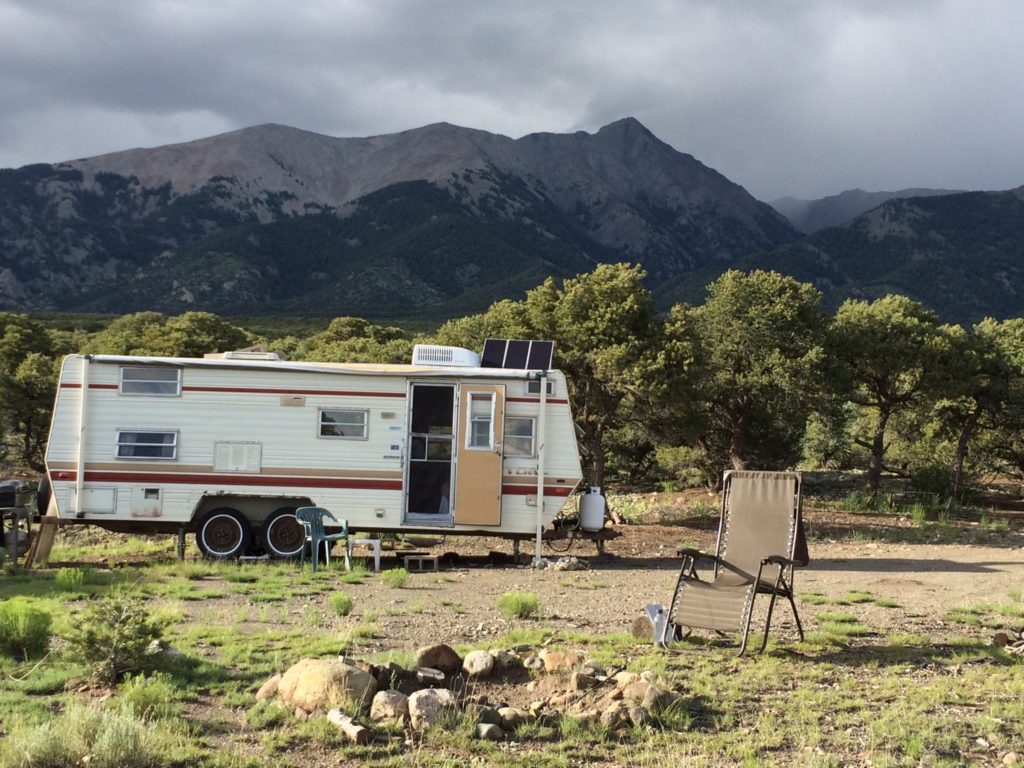
Most often I walk my prayers, blabbing out loud to Mount Blanca, or that divine Spirit, about something that’s befuddling me. Or I put the prayer into song, or sing uplifting songs I’ve learned from threshold choirs or Lama’s “Women Singing in Circle.” My heart lightens and more clarity usually results. Later, meditation allows me opportunity to be quiet and listen, attempting—over and over––to calm my mind’s chatter.
Exercise grounds me. I walk on a nearby levee that offers 360-degree views. Since I walk this area daily, seasonal birds become familiar with me and sometimes fly along beside or hover above me on my path (lately a redwing blackbird and tree swallow). Watching and listening to birds fill me with joy, and can be a perfect distraction when I’m worried about something. As author Erling Kagge says, “Walking expands time rather than collapses it.” In this relaxed state of mind, I often write an entire story in my head while strolling, returning home to tap it out on my keyboard.
Dogs and Dirt
At age nine I got my own dog. My lifelong relationships to furred friends continue to prove how consistently supportive it is to love and be loved by dogs. Recently my dog, Mercy Mercy Me, was at the vet’s for the day having her teeth cleaned. Not having her under my desk where I could rub her ears while reading or during a pause from writing, and not having her herd me through the house by pushing her nose against my legs, made our home space feel like a big, sad empty hole.
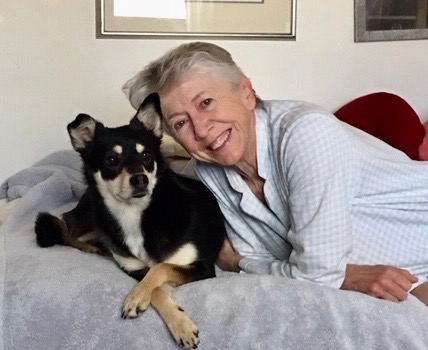
Dirt helps. I grow herbs and greens in a greenhouse and also keep a flower garden outside my studio window. Getting my hands in soil works wonders, and standing outside and watering comfort me. Nonthreatening bees buzz around coy flowers as sunlight reflects a rainbow of colors in the spray of water.
Reading, Crafting, Cooking, and Company
Reading became an escape for me in adolescence. I would check out a book from a church library and read it during long sermons, then finish it later in the afternoon. Reading offered me other realities. I read every Nancy Drew, Hardy Boys, and Bobbsey Twins book in that library. Reading remains a critical part of my daily coping and survival skills. I read multiple genres and usually two to three books at a time that allow me to learn, explore, reflect, and daydream. Here’s a picture of the diverse collection beside my bed right now.
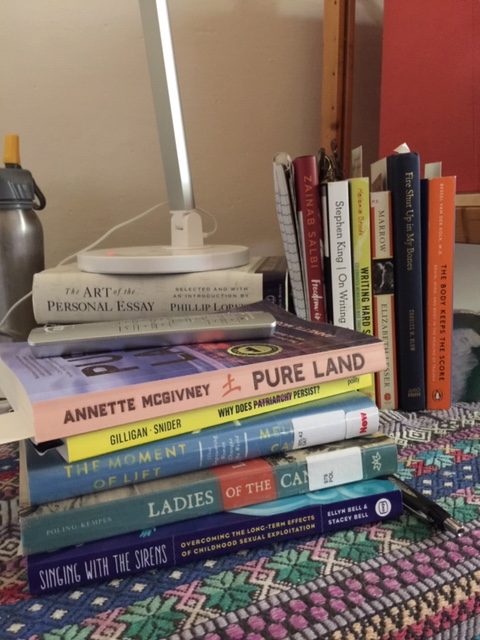
I turned an old coal room in our home into what I call my cwafty-wafty room, a place to make cards, mobiles, collaging journals, and more. Sometimes when I’ve had it with my writing, retreating to this small, cozy space with no desire to be productive feels like just the ticket to greater peace of mind.
Acting as sous-chef and helping my spouse create dinners for us or for guests are some of our happiest times. We like to spend time in the kitchen with each other, sipping wine and chatting. When company comes, breaking bread, conversation, and laughter with friends consistently lift our spirits. (I prefer this around a campfire, but our valley wind prevents this frequently.)
Therapy, Open and Honest Conversations, and Journaling
But the three most important tools I’ve used to navigate struggles and recover from abuse and heartache have been therapy, practicing open and honest conversations, and keeping a journal.
Some therapy has been more helpful than others; it takes effort to find a person I trust then establish a working relationship. This requires work on both sides. I also recognize that this is a costly endeavor, and one where many health insurances don’t cooperate (only 10x a year, only these therapists, etc.). I choose to work with therapists who offer a sliding scale and an hour instead of 50 short minutes. Using hotlines for immediate help can be critical, and they are free (resources for these are in the back of my book and on my website).
I’m baffled why many people resist mental health care, but won’t balk at checking on their cholesterol level or blood pressure. Sadly, our culture shames seeking mental health guidance. I believe it strengthens our friendships and work and family relationships when we turn to a mental health professional with our problems––those trained to give sensitive and careful guidance––rather than wearing out our loved ones. Plus, in therapy we are encouraged to practice open and honest conversation, something I seek to strengthen rather than shutting down and numbing when I get scared, confused, or hurt.
Last, I started keeping a diary as a child and this habit continues to this day. Journaling gives me a private place to vent, ponder, and analyze in words. Clarity and perspective often result. Like meditation, I believe it doesn’t matter how long I meditate or journal––it can be for five minutes or fifty––benefits occur either way.
Any of these tools for strengthening mental health require repetition until we are finally lacing up well worn walking shoes or locating with ease a favorite therapist’s number. Doing what helps us feel good takes practice. We have a choice of where we can direct our energy: suffer and complain about what’s not working or explore what might help us feel better.
